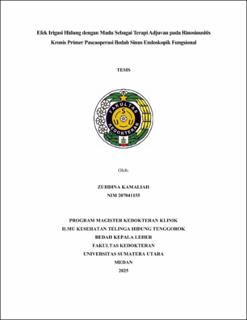Efek Irigasi Hidung dengan Madu sebagai Terapi Adjuvan pada Rinosinusitis Kronis Primer Pascaoperasi Bedah Sinus Endoskopik Fungsional
Effect of Nasal Irrigation with Honey as Adjuvant Therapy in Primary Chronic Rhinosinusitis after Functional Endoscopic Sinus Surgery

Date
2025Author
Kamaliah, Zuhdina
Advisor(s)
Rambe, Andrina Y. M
Aliandri
Metadata
Show full item recordAbstract
Introduction: Many patients continue to experience symptoms of chronic rhinosinusitis (CRS) despite receiving the most intensive topical and surgical treatments. Honey has various properties, such as antimicrobial, antioxidant, healing, and anti-inflammatory effects, which potentially reduce dependence on antibiotics and steroids in managing CRS.
Objective: This study aims to investigate the effect of nasal irrigation with a standardized honey solution on the healing of the nasal and paranasal sinus mucosa after undergoing functional endoscopic sinus surgery.
Methods: This prospective randomized controlled experimental study recruited patients with primary CRS who had previously undergone sinus surgery. Patients received sinus irrigation with either honey or 0.9% NaCl twice daily for 30 days and were given oral antibiotics and/or oral/topical steroids as indicated. Outcomes measured were changes in Sino-Nasal Outcome Test-22 (SNOT-22) scores and Lund-Kennedy endoscopic change scores on days 3, 7, 14, and 30 postoperatively.
Results: Thirty-two patients were analyzed (Honey, n = 16; 0.9% NaCl, n = 16). The change in SNOT-22 scores showed clinically significant improvement in both groups, but was similar between the honey and 0.9% NaCl groups (p = 0.215). The Lund-Kennedy endoscopic change scores improved in both groups and were significantly better in the honey group (p = 0.007). No side effects were reported.
Conclusion: Nasal irrigation with honey was well tolerated. Preliminary data indicate that honey provides a clinically important difference in quality-of-life scores and significantly better endoscopic outcomes. For a future definitive trial, multi-institutional recruitment would be required.
